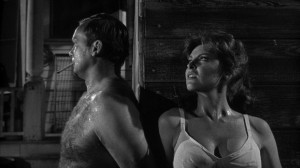
When he wasn’t genre hopping from Film Noir to Westerns to epic spectacles and war films, the perpetually underrated Anthony Mann was mixing conventions and mingling styles amongst more indefinable works. These were films like Reign of Terror (1949), The Tall Target (1951), Serenade (1956), and, perhaps his most eccentric picture, God’s Little Acre (1958). Over the course of about two hours, this idiosyncratic slice of quirky, sultry southern life is a fusion of homespun philosophizing, social commentary, sexual pervasiveness, inflated melodrama, and ventures into the downright bizarre.
Based on the novel by Erskine Caldwell, who also penned the source of John Ford’s Tobacco Road (1941), God’s Little Acre was officially adapted by Philip Yordan, screenwriter of the similarly unorthodox Johnny Guitar (1954) as well as, later, El Cid (1961), which Mann would also direct. The true writing of the film, however, is somewhat more ambiguous, as Yordan was frequently a front for the left-wing Ben Maddow, a target of blacklist-era suspicion. This sort of indistinct gestation of God’s Little Acre suits the film well, as it too is a schizophrenic blend of diverse narratives, performances, and forms.

A boisterously animated Robert Ryan, acting here quite unlike he ever has, is Ty Ty Walden, a Georgia farmer bent on finding the gold his grandfather supposedly buried on their farm. He’s aided by two of his sons, Shaw (Vic Morrow) and Buck (Jack Lord, later to star in the popular television show Hawaii Five-O). The latter is married to the stunning Griselda (Tina Louise, later to star on Gilligan’s Island). Animosity between husband and wife is quickly established, and much of it derives from a past relationship she had with Will Thompson (Aldo Ray), who is now married to one of Ty Ty’s daughters, Rosamund (Helen Westcott). It also doesn’t help that the exaggeratedly attractive Griselda causes nearly every male in the film to ogle incessantly; this includes, rather awkwardly, Ty Ty and Shaw. This much of the family is first seen in Ty Ty’s field, which is peppered with mounds of dirt shoveled aside to yield one gaping hole in the ground after another. They’ve been at this for quite some time.
Living nearby, but brought in to be a part of the gold quest, is another daughter, the kooky Darlin’ Jill (Fay Spain). She is the object of Pluto Swint’s lusty affection. Swint is a most unlikely sheriff candidate (who nevertheless does get elected) played by the bumbling Buddy Hackett. It is Swint who suggests that Ty Ty enlist the services of an albino to help him find the hidden treasure. Quite straight-faced, Swint asserts that albinos possess secret powers: “They can see right through the ground.” Ty Ty, who had previously decried superstition (he repeatedly touts a “scientific” approach), is nonetheless quickly convinced. The audience is, for better or worse, denied the albino wrangling, but we soon see that sure enough, this crew has attained this apparently exotic creature. Not that they care (an albino could be from another planet the way they act), he is named Dave Dawson (another TV connection: Michael Landon, future star of Little House on the Prairie). While initially rather reasonable, God’s Little Acre takes a turn to the surreal with this peculiar plot component that doesn’t really get anyone (or the film) anywhere, though Darlin’ Jill, for all the wrong reasons — primarily, and probably solely, his unusual pigmentation — is instantly smitten by Dave. It is, however, darkly ironic to see the farmhand Uncle Felix (Rex Ingram), an African American, standing over Dave with a shotgun ordering him around. And it must also be admitted that the matter-of-factness that follows regarding Ty Ty’s use of Dave is, at times, quite funny: “What would I be doing with an albino if not to get gold?” he asks, as if it should be obvious.

A side drama, which compared to the gold digging and albino retaining emerges as the more practical narrative, revolves around Peach Tree Valley, home to Will and Rosamund. In this distressed company town, where the chief source of employment and income was the now six months inactive cotton mill, Will persistently drinks (and apparently abuses his wife), as he and the other out-of-work men wait mournfully for the mill to get up and running again. Mann shows his noir roots in these sequences; always shot at night, the lighting of the streets evocatively illuminates the mass of men huddled in the shadows. Will’s combustible nature also gives the sense of danger and dread that ran through so many of Mann’s earliest features. While this semi-urban milieu stands in contrast to the comparatively Western setting of the farm, it’s more than just visual differences that affect the characters. The town vs. farm conflict, coupled with the Will/Griselda past, emerges as a frequent, if underexplored, cause of strife between the brothers and Will. He disparages their toiling away on the farm, while they see him as being uppity in his highfaluting “townie” attitude. This sentiment is also echoed later by the emergence of yet another son, the cotton broker Jim Leslie (Lance Fuller). He lives in the even more sophisticated Augusta, in a nice house full of what Ty Ty condemns as “breakables”. Now widowed, he has made a clear break from his less refined, though more genuine, family, and not without some ill will.
As God’s Little Acre progresses, these various narrative elements collide and merge as the film’s main themes become apparent. Among them is a constant suggestion of naïve stubbornness working for and against the characters. On the one hand, this refusal to deviate from the norm acts as a motivating factor in their lives: if they did change their ways, would they know what to do? Especially for Ty Ty, tenacious routine seems to keep his life worth living. On the other hand, blindly clinging to one’s past — past relationships, past jobs, past rumors — hinders emotional evolution and existential mobility.
With Mann’s notable use of setting in his Westerns and Films Noir, it is no surprise that he skillfully utilizes what this region has to offer, in terms of substantive natural elements, to enhance personalities and action. Aided immensely by the renowned cinematographer Ernest Haller, the photography gives a tangible sense of stifling southern heat. With a majority of the scenes playing out in daytime exteriors, the sun beats down on the performers as they’re constantly wiping their sweaty brow, dirt caked to their glistening faces, and the related violent and sexual pressure enhanced by these conditions grows increasingly hazardous.

God’s Little Acre also contains a notable attention to detail, in setting and dialogue. In the case of the former, minutia like flypaper hanging from ceilings gives the entire film a localized authenticity. Concerning the latter, down-home moralizing (a “street of sin and shame” outside a saloon) and humble musings (“God never made a finer raincoat than a man’s skin”) contribute to a richness in character development. Other comedic comments, especially from the unpretentious Ty Ty, help to leaven some of the tension in certain parts of the film (his comment about one of Jim Leslie’s paintings being more beautiful than the newly erected Coca-Cola signs comes to mind).
And finally, one can’t really discuss this film without noting its overt sexuality. Made at a time when Hollywood was pushing the boundaries of such explicitness (this was two years after Elia Kazan’s Baby Doll, probably God’s Little Acre’s closest kin), the at times comically obvious sexual suggestiveness seems unavoidable, particularly when Tina Louise enters the frame. One scene, for example, borders on self-conscious parody as she, wearing only a slip, cools down by dowsing herself in well water and then intimately encounters Ray, shirt off, smoking and sweating profusely. These moments are never tawdry—it’s all in good fun—and indeed some of the implied sexual banter is quite amusing: “Is that watermelon cool and ripe and ready to eat?” asks Ty Ty when Griselda exits the house bearing the voluminous fruit.
A most unusual film by a tremendously talented filmmaker, God’s Little Acre is an underseen gem of cinematic distinction. Captivating performances (if not fully convincing), exceptional cinematography, and a curiously unpredictable story keeps the whole thing uniquely fascinating in spite of its occasional, inconsequential faults.
God’s Little Acre was released on Blu-ray and re-released on DVD by Olive Films
This REVIEW was previously published in FILM INTERNATIONAL
No comments:
Post a Comment